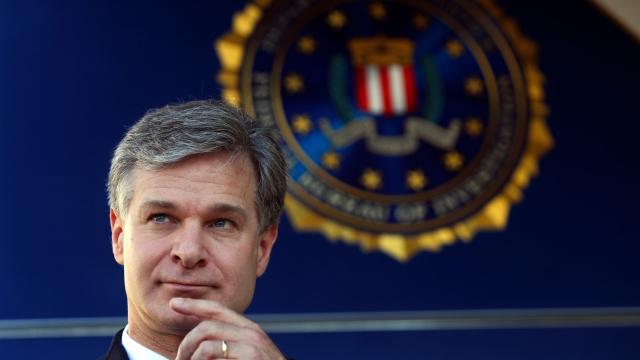For more than a decade now, FBI directors have been ranting about investigators being cut off from prized intelligence sources thanks to the widespread adoption of digitally encrypted communications. The truth, of course, is that humanity’s ever-increasing reliance on the internet has given today’s Federal Bureau of Investigation access to more data than its disreputable predecessors would have ever dreamed possible.
FBI Director Christopher Wray shown before speaking to reporters during a dedication ceremony for the new Atlanta Field Office building Thursday, Oct. 12, 2017, in Atlanta.Photo: AP
The notion that technology such as mobile phones and the internet have made information-gathering more difficult is a view expressed solely by the FBI in an ominous scenario it likes to call “Going Dark.”
In publicising and politicising this view, the FBI seeks to convince lawmakers, courts, and technology manufacturers that the only the way to put the country on proper war footing against domestic terrorists is to purposefully compromise consumer security products by installing a “backdoor” into commercially available encryption. This solution is notable as the world’s foremost cryptographers — experts in the study and practice of secure communications — say what the FBI desires is impossible.
Strong encryption and so-called “backdoors”, in other words, are mutually incompatible.
Point of fact: If you outlaw strong encryption, only criminals will have it. The United States is not the only country in the world producing its own encryption products, after all and no authority can reasonably hope to curb its importation. Encryption software is downloaded, covertly if necessary, not offloaded from a cargo freight.
A Motherboard investigation, relying heavily on public records requests, has unearthed even more evidence that “backdoors” are unnecessary. State and local police forces across the country today appear to be in possession of technology known as GrayKey, a device, reportedly 10x10cm in size, used to defeat the encryption on iPhones running the latest versions of iOS.
Expert cryptographer Matthew Green, an associate professor at Johns Hopkins Information Security Institute, told the website that GrayKey’s existence and widespread procurement belied the FBI’s doomsday scenario. “It demonstrates that even state and local police do have access to this data in many situations,” he said.
Following the San Bernardino shooting in December 2016, the US Department of Justice fought to force Apple in court to unlock an iPhone 5C belonging to one of the terrorists. The proposed solution was a bypass that would allow FBI to bruteforce iPhone passcodes without delay (“please wait 30 seconds and try again”) and without the iPhone deleting user data in response to multiple failed attempts.
Motherboard’s public records requests found that various regional police agencies, such as the Maryland and Indiana state police, had procured GrayKey boxes, as has the Miami-Dade County Police. Other internal emails have shown the Secret Service and Drug Enforcement Agency (DEA) expressing interest in obtaining the technology. The State Department has already.
There’s been renewed interest in Going Dark since the resignation of former FBI Director James Comey, who was also a strong proponent of the misguided “backdoor” solution. Last month, Christopher Wray, the FBI director appointed by President Trump, said he didn’t “buy the claim that it’s impossible,” referring to the expert opinions of mathematicians that the “backdoors” idea represents magical thinking.
“Let me be clear: the FBI supports information security measures, including strong encryption,” Wray said. “Actually, the FBI is on the front line fighting cyber crime and economic espionage. But information security programs need to be thoughtfully designed so they don’t undermine the lawful tools we need to keep the American people safe.”
Despite Wray’s statements, the FBI does not actually support strong encryption A few years ago, in fact, the bureau ceased advising the public to use it.
